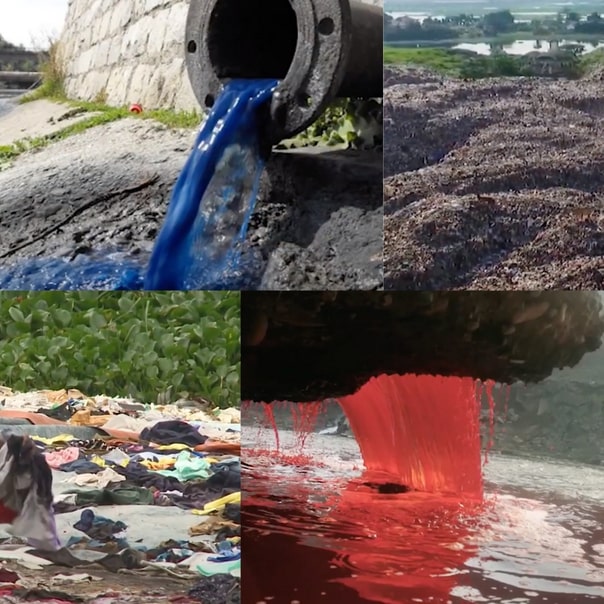Though more and more people are shifting to an organic and sustainable lifestyle, they are only focused on natural edibles and personal care items. However, they are unaware of the fact that the garments that they wear are also equally contributing to pollution.
Textile Industry is the second largest source of pollution in the world!
Cotton is also a crop, but the methods of cultivating and processing organic cotton are different. Therefore, the Global Organic Textile Standards was introduced to provide a valid certification to organic garment produce.
Your favourite t-shirt is made from more than just cotton. One key ingredient that does not appear on your t-shirt label is water. Surprisingly, it can take 2700 litres of water to produce a single t-shirt. This is the unseen water that we consume every day. So, while it is important to purchase efficient washing machines and fix leaky taps, the water we use is not the only part of our total water footprint.
The demand for freshwater is on a constant rise, while the available resources are limited. Hence we have to get smarter about how to use water. Additionally, the garment needs to be treated, woven and dyed at a facility - sometimes in an entirely different country like Bangladesh, India, Pakistan or Turkey, where the wage rates are lower.
The process of garment production accounts for 10 percent of worldwide carbon emissions. Moreover, the impact does not end there. After consumers take the t-shirt home, it is washed multiple times over a course of time, consuming water and energy along the way.
There are several textile industry belts in India, where the residents living close to these industrial belts have developed several health conditions, some really serious ones due to irresponsible and inadequate affluent discharge and treatement systems.

Global Organic Textile Standards is a globally recognized organic textile standard. Unlike many certifications for natural products, it avoids the use of toxic chemicals in the production process as well as throughout the supply chain. It streamlines the entire process and ensures the organic status of the garments right from the beginning - harvesting the raw materials, responsible manufacturing to labelling for credibility. GOTS was introduced in 2006 and has been implemented by companies across the world.
Organic Amrit's Co-Founder Mr. Indraneel Hariharan met Mr. Ganesh Kasekar, GOTS-South Asia Representative and also interviewed him to spread the awareness of GOTS certified textiles.
GOTS Emphasizes and Builds Upon the Following Distinctive and Unique Features
With today’s sustainability challenges and the contribution of the textile and fashion industry to these challenges, we must rethink the production and consumption of textiles. Organic fibres focus on creating an industry that substantially lowers the environmental impact and gives importance to human health.
A garment carrying the GOTS label must contain at least 70% of organic fibres and a product grade with the label ‘organic’ must have at least 95% certified organic fibres.
To construct a truly sustainable industry, the GOTS label examines the manufacturing and processing of textiles based on environmental and social criteria. This includes everything from chemicals used to ethical treatment of labourers. To become a GOTS certified facility, it is compulsory to meet all the criteria.
The certification standards cover all processes including processing, manufacturing, packaging, labelling, trading and distribution of garments that are made from at least 70% organic fibres. All actions should be certified to strict ecological and social criteria to carry a GOTS label. This way, GOTS puts an end to greenwashing.
The certification of organic fibre production is based on the international standards sanctioned by the IFOAM Family of Standards. On-site inspection of manufacturers, processors and traders is performed by the Third-Party GOTS accredited Certification Bodies, which forms the basis of the GOTS monitoring system.
Buy GOTS Certified Clothes NowGOTS can be applied to products like fabrics, yarns, home textiles and many more that are made from organic fibres. However, it should be noted that this criterion does not apply to leather products.
- Reduction of risk through strict environmental and social criteria.
- Prepare the organization to perform the best using stringent regulatory climatic conditions.
- Companies that receive that GOTS scope certificate can advertise their certified status for free.
- Gaining the trust of vendors and customers.
- Credibility through on-site inspection, dual quality assurance and product testing.
- Become listed in the GOTS public database.
There are more GOTS-certified manufacturing plants in India as compared to the USA, China and Bangladesh. However, there is a need for awareness about the GOTS among the Indians. Whether it is saving energy, decreasing waste or being a conscious consumer, small steps can make a huge difference.
Shruti Satam
Mumbai,
Maharashtra
Blogger and Web Content Writer